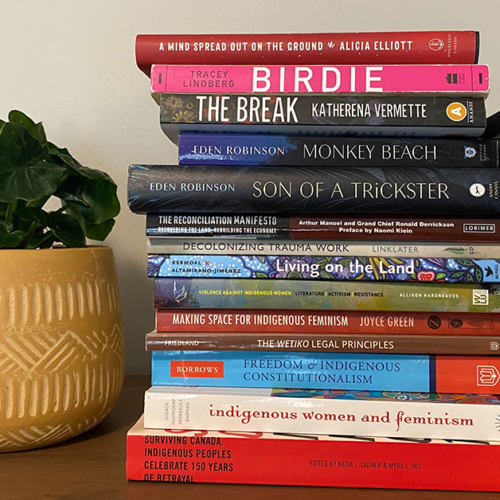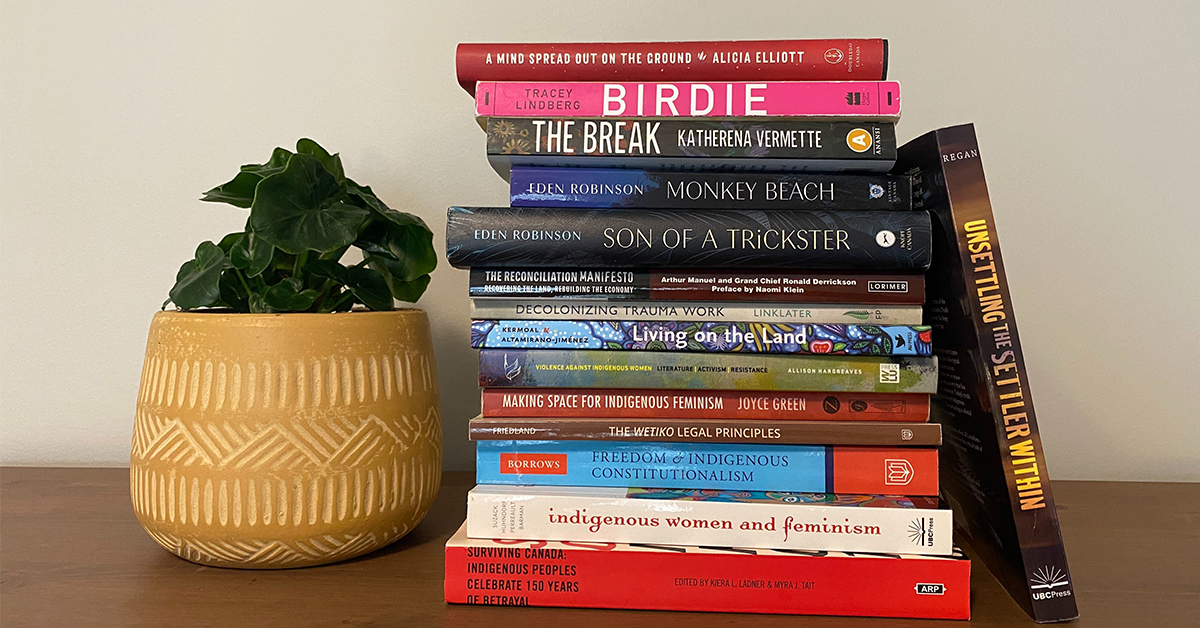Switchboard Celebrates National Indigenous History Month
 By Switchboard Celebrates National Indigenous History Month
By Switchboard Celebrates National Indigenous History Month
June 30, 2020

In June, Canadians celebrate National Indigenous History Month, honouring the history, heritage, and diversity of Indigenous peoples in Canada.
This year, we decided to use National Indigenous History Month as an opportunity to explore the flourishing Canadian Indigenous literary scene. I went into my library, and asked that each team member read either a fiction or nonfiction book written by an Indigenous author. My hope was to expose more people to some of my favourite Indigenous authors, and (selfishly) to have more people to talk about some of my favourite books with.
Some may wonder what reading Indigenous authors, particularly fiction writers, can teach us about the history of Canadian colonialism and Indigenous culture today. To me, these books challenge readers to critically consider and rethink their assumptions about Indigenous literature, history and politics, while never forgetting the emotional connections of our shared humanity and the power of story to effect personal and social change.
These books have led me across North America, from the forests of Kitimat, to residential schools in Ontario, to the lives of families on reserve. Whether it be Thomas King, Tracey Lindberg, Eden Robinson, or Katherena Vermette, Indigenous authors have been absolutely critical to me working in Indigenous law and relations, and have challenged my own prejudices and biases as a member of settler society.
Beyond exposing the different experiences faced by Indigenous peoples, many of these books explore universal themes of family, loss, and unexpected joy that almost anyone can relate to. Finally, they are simply great reads!
Our team shares their insights from the books they selected:
Son of a Trickster, Eden Robinson
Eden Robinson is a member of the Haisla and Heiltsuk First Nations from Kitimat, B.C. In Son of a Trickster, a teenage boy wades through the complications of a broken family, social pressure, drugs, alcohol, and poverty and discovers the Haisla trickster Wee’jit. The story is set in Kitimat, British Columbia.
“Jared’s life reminds us all of our complex, difficult family dynamics. While Robinson’s writing makes a clear connection between Jared’s life and being Indigenous impossible to ignore, understanding these differences actually brings more compassion, empathy, and understanding to Jared than you would expect.”- Kathleen
From the Ashes, by Jesse Thistle
Jesse Thistle is Métis-Cree, from Prince Albert, Saskatchewan. In this memoir, Jesse recounts how he and his two brothers were raised by his grandparents after being abandoned by his real parents. Jesse’s grandparents kept his Metis heritage from him, which left Jesse following in his father’s footsteps of battling alcoholism, drug addiction, and crime. Now one of the most well-recognized PhD scholars in Canada, Jesse is a recipient of the Governor General’s Silver Medal, and is a Trudeau and Vanier Scholar.
“Jesse opens our eyes to the long-term effects of childhood abandonment, and the impact the child welfare system has on Indigenous peoples. Jesse’s story paints a picture of how frequently the systems fail Indigenous people, and the resiliency and sheer perseverance needed to pull oneself out of that environment.” – Karli
Indian Horse by Richard Wagamese
Award-winning author and journalist Richard Wagamese is an Ojibway from the Wabaseemoong First Nation in northwestern Ontario whose work is deeply influenced by Indigenous experiences in Canada’s residential school system. Indian Horse tells the story of Saul Indian Horse as he enters rehab for alcohol abuse after a bender that nearly killed him, and chronicles his life from childhood to the present, including his experience living a traditional Ojibway life in Ontario and his abduction and placement in a residential school.
“The theme of identity and what it means to lose your sense of self resonated the most with me, arguably because it’s something I’ve never had to face. Indigenous people were treated as less than, and in many instances still are today, which is something we as white people need to fight against.” – Nicole
Share
Next Post:
On Air - Collision From Home